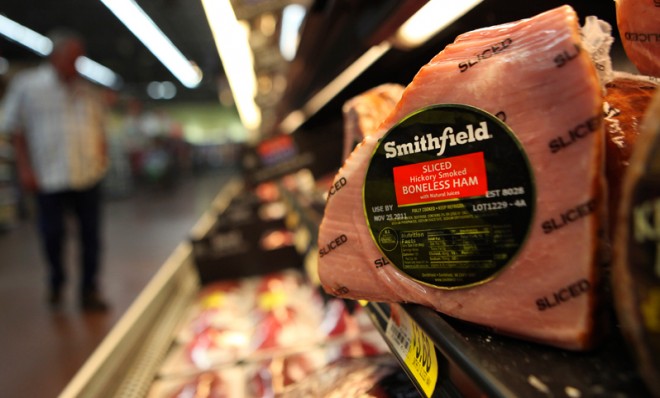Why China is spending nearly $5 billion for pork
The largest-ever Chinese takeover of a U.S. company is all about bringing home the bacon

A free daily email with the biggest news stories of the day – and the best features from TheWeek.com
You are now subscribed
Your newsletter sign-up was successful
Today, the largest-ever Chinese takeover of a U.S. company was put into motion when Shuanghui International Holdings agreed to buy Smithfield Foods for $4.7 billion.
The reason for the deal: Pork. Fatty, delicious pork.
People in China can't get enough of it. The country leads the world in pork consumption, with the average person eating 86 pounds of it a year. China also leads the world in pork production, churning out 50 million metric tons of it in 2010, which is twice the amount produced in the European Union and five times that of the United States.
The Week
Escape your echo chamber. Get the facts behind the news, plus analysis from multiple perspectives.

Sign up for The Week's Free Newsletters
From our morning news briefing to a weekly Good News Newsletter, get the best of The Week delivered directly to your inbox.
From our morning news briefing to a weekly Good News Newsletter, get the best of The Week delivered directly to your inbox.
However, despite China's porcine obsession, it still relies on small family farms to raise pigs. The deal with Smithfield would give China access to the United States' massive factory-farming system.
The deal is also a no-brainer for Smithfield, maker of the famous Smithfield Ham. The company is the largest hog producer in the United States — a country where pork consumption is actually on the decline.
"This transaction will allow us to access Asia in a big way," C. Larry Pope, Smithfield’s chief executive, told The New York Times. "This is an export deal, and they are very interested in exporting products out of the U.S."
Virginia, where Smithfield is based, is no stranger to doing business with China. Virginia Gov. Bob McDonnell (R) announced last month that the state sent $638 million in agricultural exports to China in 2012, making it Virginia's largest trading partner.
A free daily email with the biggest news stories of the day – and the best features from TheWeek.com
The deal, valued at $7.1 billion including debt, will have to withstand scrutiny from federal regulators. Often, the concern with Chinese take-overs is national security; here, it will be about food safety.
In 2011, Shuanghui was accused of selling pork contaminated with clenbuterol, a feed additive more commonly known as "lean meat powder" that can cause nausea in humans. At least 2,000 pounds of pork were recalled and dozens of people lost their jobs.
If the deal is approved by regulators and shareholders, it should go into effect before the end of 2013.
Keith Wagstaff is a staff writer at TheWeek.com covering politics and current events. He has previously written for such publications as TIME, Details, VICE, and the Village Voice.
-
 Crisis in Cuba: a ‘golden opportunity’ for Washington?
Crisis in Cuba: a ‘golden opportunity’ for Washington?Talking Point The Trump administration is applying the pressure, and with Latin America swinging to the right, Havana is becoming more ‘politically isolated’
-
 5 thoroughly redacted cartoons about Pam Bondi protecting predators
5 thoroughly redacted cartoons about Pam Bondi protecting predatorsCartoons Artists take on the real victim, types of protection, and more
-
 Palestine Action and the trouble with defining terrorism
Palestine Action and the trouble with defining terrorismIn the Spotlight The issues with proscribing the group ‘became apparent as soon as the police began putting it into practice’